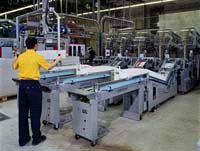Finishing & Screen Printing
TMP Reduces Casual Labour Costs on Disk Winding By 25% Following JobFeed Installation

Thursday 22. January 2009 - The expansion of WRH Marketing UKs JobFolio series of ancillary post press equipment, which now includes feeding, stacking, strapping and underwrapping machines, has been met with great enthusiasm by commercial and newspaper printers.
Following the huge success of a JobFeed system at TMPs Birmingham site, the group has since installed a range of JobFeed and JobStack equipment at newspaper plants in Cardiff, Teeside and Blantyre.
“We had a requirement at Birmingham to reduce the number of casual employees who we had to bring in every week to handle magazines for inserting into the Sunday Mirror and Sunday People,” says Alex Henderson, general manager of the Birmingham and Cardiff sites. “We installed a JobFeed system and with that one unit alone reduced the casual workforce by 25%, which means that the JobFeed system paid for itself within nine months. We later took delivery of two JobFeed systems at Cardiff and the savings there have been even greater.
“Weve also increased productivity. When manually feeding the magazines, supplements and leaflets that go regularly into the weekend titles to disk, we achieved speeds of less than 20,000 copies an hour. The mobile JobFeed unit will easily handle 30,000 copies an hour and achieve this with great reliability week after week, with no variation in throughput.
“The third huge advantage has been the increase in the quality of feeding. Inserts are fed on to a Ferag DTR so that they can subsequently be unwound and inserted into the main title at normal production speed. Weve found that the JobFeed unit feeds supplements on to the Ferag DTR much more accurately than can be obtained manually and this increases productivity when unwinding.”
The high performance JobFeed can be interfaced to virtually any flat pile feeder including those from Ferag, Heidelberg/Harris/AM, Muller Martini, Kolbus, Sitmas and Buhrs. JobFeed can be used for a wide range of types of work such as newspapers, catalogues, directories, books and magazines. The ergonomically designed units are easy to use and maintain, while their rugged construction ensures they are built to last. Changing over between jobs can be carried out quickly.
Features include variable speed and synchronised tail and side joggers. The single, continuously arched infeed conveyor provides excellent control of the product, resulting in fewer machine stops and less wastage. The JobFeed unit can handle the smallest to the largest product, feeding them securely and reliably into virtually any pocket or hopper on the market. The pile height adjusts automatically to ensure consistent feeding. The CE certified unit has an optional log extension, which increases capacity.
David McMurdo, production manager at TMP Blantyre, is also full of praise for the JobStack unit that was installed at the site in September. “One of our customers wanted us to produce a regular four-page insert that had to be folded to quarter-fold tabloid,” says Mr McMurdo. “However, our existing stackers could not cope with the size or the rather flimsy stock. We looked around at what was available and JobStack was the one system that promised to handle this rather awkward job. Since its installation JobStack has done everything we have wanted of it, stacking the inserts with great reliability and at whatever speeds we have demanded.”
The JobStack Series consists of two state-of-the-art compensating stackers for the low to mid performance sectors. JobStack 20 processes between 1 mm to 32 mm at speeds up to 20,000 cph and is designed for use with gatherer-stitchers and perfect binders. JobStack 75 has been built for use with newspaper and commercial web presses, rotary three-side cutters and inserting machines. It can handle 75,000 cph and paginations between four and 96 pages.
